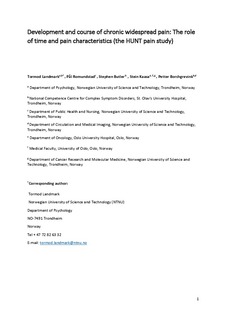Development and course of chronic widespread pain: the role of time and pain characteristics (the HUNT pain study)
Journal article, Peer reviewed
Accepted version

Åpne
Permanent lenke
http://hdl.handle.net/11250/2636104Utgivelsesdato
2019Metadata
Vis full innførselSamlinger
- Institutt for klinisk og molekylær medisin [3587]
- Institutt for psykologi [3141]
- Institutt for samfunnsmedisin og sykepleie [3712]
- Institutt for sirkulasjon og bildediagnostikk [1934]
- Publikasjoner fra CRIStin - NTNU [38688]
- Publikasjoner fra Cristin - St. Olavs hospital [1611]
- St. Olavs hospital [2577]
Sammendrag
Chronic widespread pain (CWP) is common and associated with loss of functioning and health. Subjects with chronic nonwidespread pain (CnWP) are at increased risk of developing CWP, but few studies have described the nature of the development over time. We followed a random sample of 3105 participants from the population-based HUNT 3 study with 5 annual measurements of pain over 4 years. Although 29% reported CWP on at least 1 occasion, only 7% reported it consistently on 4 or 5 occasions. The average annual cumulative incidence was 5%, and the recovery rate was 38%. In mutual adjusted analysis, the risk of developing CWP from 1 year to the next was higher in subjects with chronic pain (relative risk [RR] = 2.4; 95% confidence interval [CI]: 1.8-3.4), 2 or more pain regions (RR = 3.3; 95% CI: 2.5-4.4), moderate pain or more (RR = 1.8; 95% CI: 1.5-2.6), and with comorbid chronic disease (RR = 1.6; 95% CI: 1.3-1.9). Developing CWP was associated with a modest concurrent change in self-reported mental and physical health. The risk of developing CWP between the fourth and fifth occasions was 80% lower for subjects without a history of CWP, compared to those with a history of CWP. For subjects without previous CWP, the development was associated with previously reported CnWP, but not with the number of occasions with CnWP, in analyses adjusted for sex, age, and pain severity. A substantial proportion of the new cases of CWP originates from subjects floating below and above the definition for CWP over time and, thus, does not seem to involve major transitions in health.